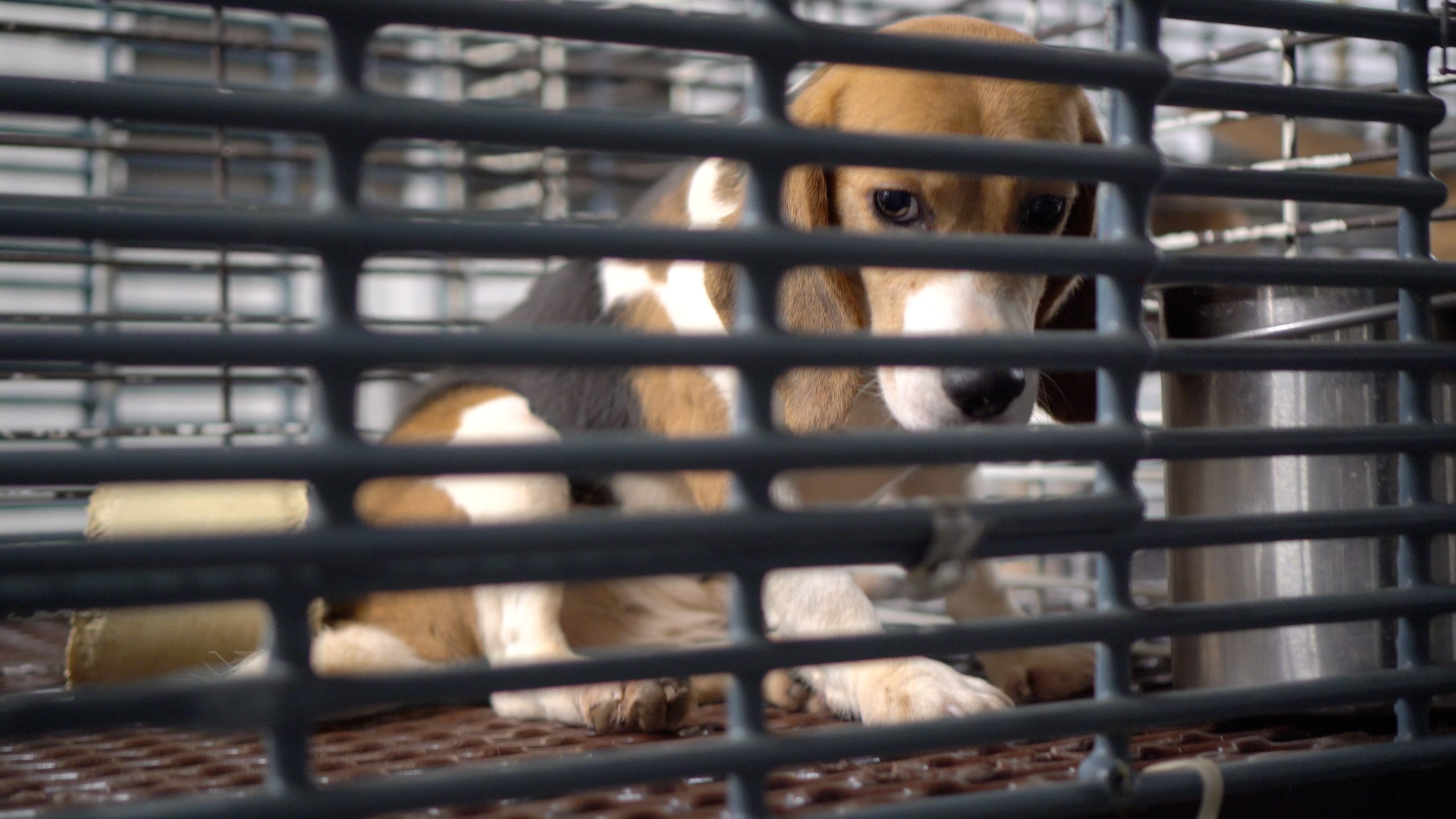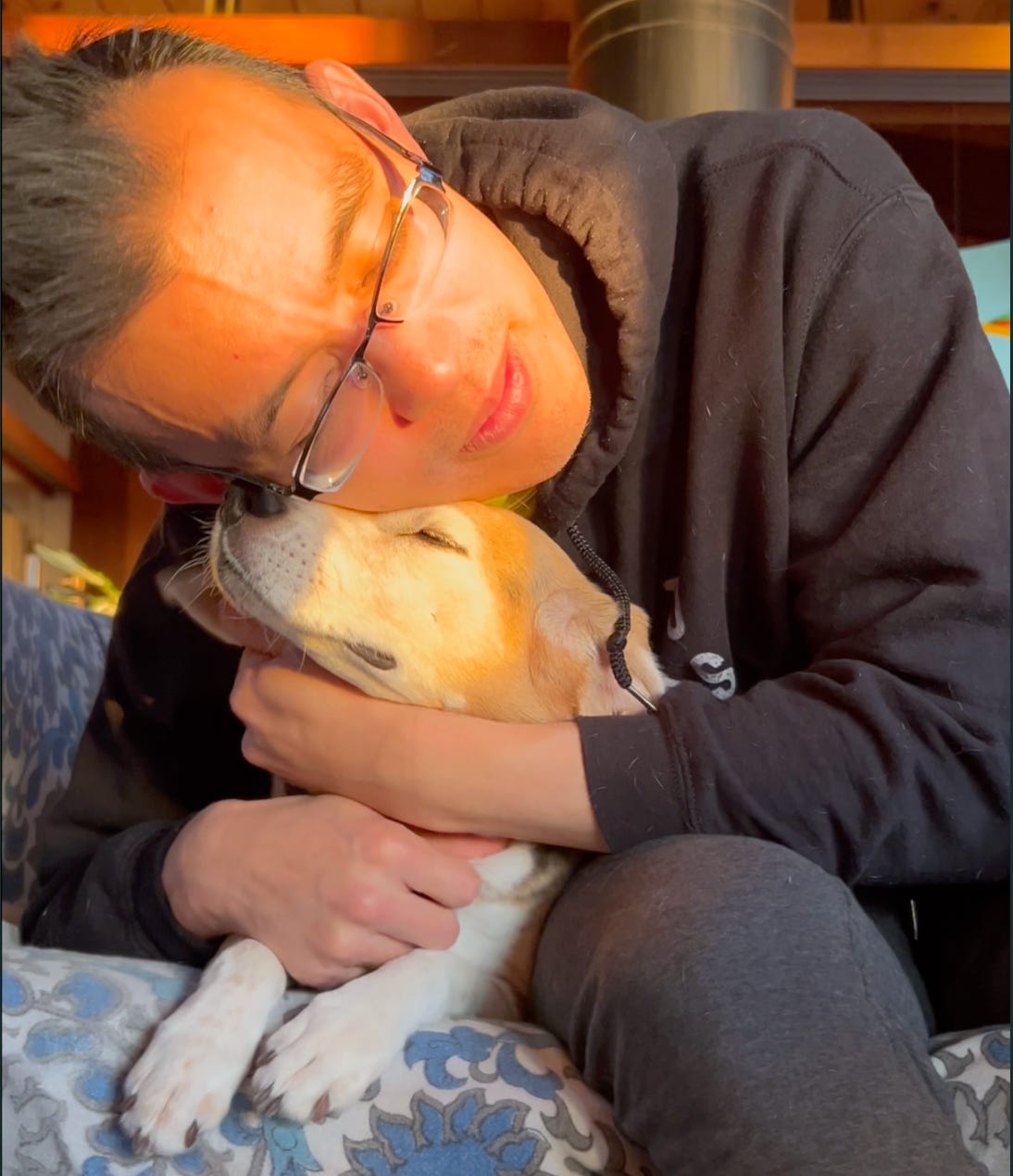|
The (Special) Prosecution of Ridglan Farms
Billions of suffering animals don’t need us to change laws. They just need the laws to be enforced.
On March 20, days after the government of Wisconsin dropped all charges against me for rescuing a blind beagle puppy from a cage at Ridglan Farms, we turned the tables on the industry.
Using a legal procedure that has been in the news recently because of the criminal trials of Donald Trump, we filed a petition with the Circuit Court of Dane County, Wisconsin for the appointment of a “special prosecutor” to bring criminal charges against Ridglan for the abuse of dogs.¹ The opening paragraph of the petition sets out our argument:
This case confronts a simple question: can a corporation get away with hoarding and abusing thousands of dogs? The facts presented in this petition, including the surgical mutilation of dogs without anesthetic, would unquestionably be criminal animal abuse if undertaken by an ordinary citizen. The question facing this court is whether, after years of governmental inaction, corporations also will be held accountable to the law.
The role of a special prosecutor – which first became famous in the Watergate era – is to take on a criminal prosecution when the government itself is unable to do so, whether due to conflicts of interest or because the government is asleep at the wheel. The inability to prosecute was apparent in the Watergate case, where President Nixon’s campaign was accused of burglarizing the offices of his opponents. President Nixon repeatedly blocked the Department of Justice’s investigation of the allegations, going so far as to kidnap his own Attorney General’s wife! An independent special prosecutor, Archibald Cox, was thus appointed to ensure the investigation could proceed without interference; the rest, of course, is history.
A special prosecutor is just as important to the Ridglan case. The Dane County District Attorney, Izmael Ozanne, has a conflict of interest in investigating animal cruelty, given that he has relentlessly pursued critics of the industry, such as me, with serious felony charges.
The government has also been asleep at the wheel in its response to allegations of abuse; for years, it failed to respond to complaints that Ridglan was violating the law. For example, in April 2017, when I saw Julie and other beagles exhibiting signs of severe psychological stress from solitary confinement in a cage, the government already knew that dogs were showing “abnormal, stereotypical behaviors” at Ridglan, such as “circling, pacing, and wall bouncing.” Indeed, as we set out in the petition, those are the exact words of an inspector who visited the facility in October 2016 – yet nothing was done to stop the abuse from continuing months later in April 2017 when I visited Ridglan Farms. For two hours, this is what I saw every time I looked into Julie’s cage:
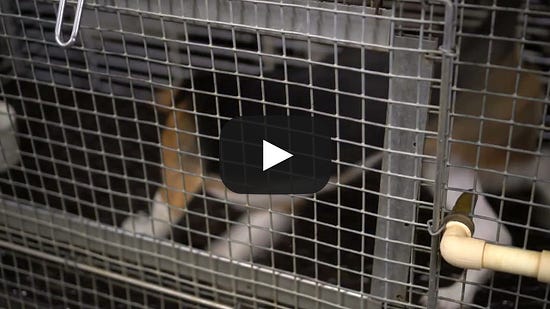
But it gets worse. The government has continued to ignore cruelty at Ridglan even after being presented with shocking evidence from former employees that Ridglan is surgically mutilating dogs without anesthesia. Dr. Sherstin Rosenberg, a veterinarian who interviewed one such employee, describes untrained staff performing a so-called “cherry eye” surgery – the removal of an infected eye gland – without a veterinarian’s supervision or painkillers. The employee was traumatized from being forced to hold a dog down, as a piece of her eye was sliced off. They described it to me as a “blood bath.”
In the face of these allegations, the DA’s primary public response has been to accuse animal rights activists of “death threats.” (Unlike our allegations of animal cruelty against Ridglan – which are backed by a mountain of evidence – the DA has failed to come forward with any evidence of such threats.)
And so, for the first time in my history as an activist and lawyer, on April 18 I will be arguing in court to bring criminal charges, rather than defend against them. I and a local nonprofit, Dane4Dogs, jointly brought a petition to appoint a special prosecutor to investigate Ridglan Farms, based on the government’s refusal to prosecute animal cruelty. And while the odds are politically stacked against us – 10 of the 20 biggest employers in Dane County, WI are in the biomedical industry – we have compelling evidence and, by all accounts, a fair judge appointed to hear the case. This is the best shot we have of forcing the legal system to actually enforce the law.
There is a broader point here. One of the greatest misconceptions in animal rights is that we need to change laws to protect animals from abuse. In fact, the vast majority of suffering animals are already protected. It’s just that no one is enforcing the law.
For example, even states such as Utah, which has a notoriously pro-factory-farming political climate, have laws against animal cruelty, which criminalize the failure to provide any animal with necessary care. While Utah has an exception to the cruelty law for any creature who is raised “with accepted animal husbandry practices,” the industry routinely violates these “accepted animal husbandry practices” with impunity. Take this scene I shot at the nation’s largest pig farm in Utah, owned by Smithfield Foods, in March 2017:
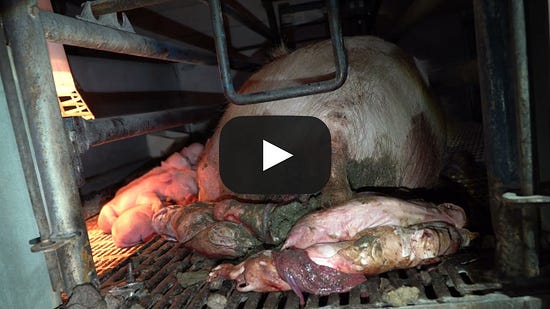
What we saw at Smithfield was not just cruel but a violation of “accepted animal husbandry practices.” The gestation crates we found by the thousands were in direct violation of the company’s 2007 promise to ban them. The piles of dead piglets in crates violated a requirement that “dead animals [be] removed from the living space.” Smithfield knew this, so it resorted to accusing us – hilariously – of staging the video. Journalist Glenn Greenwald’s response was perfect: “It would take a Hollywood blockbuster budget and the most sophisticated team of computer-generated imagery for that.” If only we had the resources.
But despite Smithfield’s absurd excuses, the government failed to even investigate the abuse. (It did, however, send a mob of agents across state lines chasing after two piglets we rescued from a similarly gruesome fate. That criminal case ended in our acquittal in October of 2022.)
The same nonenforcement of cruelty laws is unfolding in Wisconsin at Ridglan Farms. The state’s animal cruelty law says, “No person may treat any animal… in a cruel manner’ and even spells out specific facts that constitute cruelty, including “[i]nadequate space… indicated by evidence of… stress or abnormal behavior patterns.” Recall that this is exactly what the government’s own inspection report found in October 2016: “abnormal, stereotypical behaviors'' caused by inappropriate housing. Yet instead of prosecuting the cruelty, the state of Wisconsin prosecuted us for taking Julie (the spinning dog in the above video) out of her cage.
When we obtained the October 2016 report, showing that the government knew we were right all along, I broke out into laughter from the absurdity of it all. It felt like the crazed pants-less attorney from The Simpsons. Lionel Hutz, had come to life.

It’s hard to keep laughing, however, when you realize that these absurdities, unlike The Simpsons, have a consequence: innocent dogs are being tortured and killed. So what is to be done?
The special prosecutor is one avenue for overcoming the absurdity. As with Watergate, there are times when the legal system is so broken that we need an independent attorney to oversee a case. I’m hopeful that the judge appointed to our case, an apparently brilliant jurist who was editor-in-chief of the Wisconsin Law Review when she was in law school, will be able to resist local political pressure and see the need for a special prosecutor in this case.
The more important avenue for solving the problem, however, is grassroots support. What we have learned from 200+ years of history is that words on a page, written by men in robes and suits, are not enough to protect legal rights. The only real check on corrupt administration of justice is public agitation. This is how legal protections for people of color and LGBT citizens were finally recognized, despite over a century of our legal system’s supposed commitment to words on a page: “equal protection of the laws.” Those words were not enough until people campaigned, protested, and hit the streets to protect the most vulnerable in society from a broken system of justice.
And so it will be for animals, too. The words on a page already protect them. Indeed, these protections go far beyond what even most animal rights lawyers understand, to the very basic foundation of our democracy: the American Constitution. And it is not just the dogs at Ridglan, but billions of animals living in cages and chains across the nation, whose constitutional rights are at stake. (More on that constitutional theory in a future newsletter.)
But to ensure these protections are actually enforced, it takes something more than words on a page. It takes a movement. And, on April 18, that movement will face its next challenge. People across the country, from veterinarians to celebrities to former prosecutors, will be joining our call for a special prosecutor to be appointed. For a terrified puppy trapped in a cage at Ridglan, and suffering from criminal abuse, it is perhaps her only hope. And regardless of what happens in this case, as this movement grows and strengthens, it is a hope that will be realized.
What’s up this week
We are undertaking a major revamp of The Simple Heart in the wake of the dismissal of my last criminal charges — including a listening tour and new roadmap to the right to rescue. It’s a strange feeling to not have any pending criminal charges. Much of my life has been defined by our attempts to make the state’s repression backfire. But now I have a period of relative calm and one thing to me is clear: rescue, and the trials of rescue, are crucial to saving the world. That is not an exaggeration; there is so much more at stake when we defend the vulnerable and ask our entire system to do the same. But in order for me to truly understand the stakes, and how to best communicate them with the world, the first step is to listen. It’s in that spirit that, for the next 3 months, I plan to undertake a listening tour of sorts, asking questions of our supporters and understanding what aspects of our mission are most inspiring to you. More on this in the coming weeks.
Speaking of which, I’m traveling to Denver and Madison from April 15-19 to prepare for the hearing to appoint a special prosecutor and would love to hang out. The University of Denver is the home of the Animal Activist Defense Project, where I’ll be meeting with key lawyers, such as Steffen Seitz, regarding our upcoming petition argument. I’ll be available on the evening of the 16th in Denver and on the evening of the 18th in Madison if you want to hang out! Just shoot us an email at [email protected]. I’d love to present some ambitious ideas on pushing forward with the right to rescue!
I’ve had some other fascinating conversations, including one with Vegan Gains, where we debate the merits of intersectionality (among other subjects), and another with Matthew Cox, who hosts a true crime channel and podcast. I’m increasingly convinced that YouTube is where most important political conversations — and change — are happening, so expect to see more of this. That may include our own YouTube channel focused on the right to rescue.
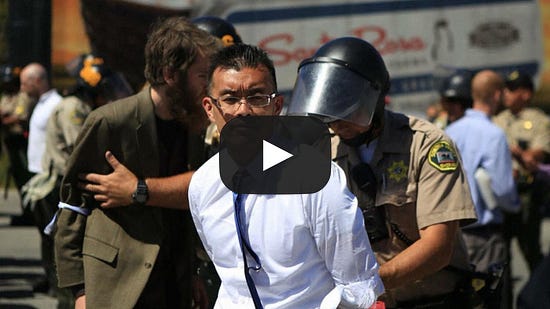
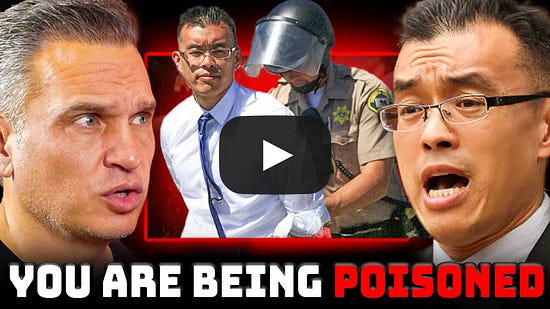
Activists at Animal Rising were in court this week after being charged for deflating tires tires at a major dairy distribution center in Sept 2022. The dairy industry is one of the most disturbing on the planet earth — causing not just climate damage and animal cruelty but, more recently, the spread of the deadly virus, H5N1 — and yet there is dreadfully little awareness of these harms. Six activists took guilty pleas this week after trying to change that; another 7 plan to go to trial, but (as with our cases) their ability to present a legal defense is being curtailed. I’ll continue watching and supporting as this case moves to trial. I hope you do, too. It’s one of many cases facing Animal Rising in the coming months, including a trial for the rescue of King Charles’ sheep. Check out this video on that case.
We are looking for folks to help us out with this newsletter! Writing is the foundation of everything I do, and whenever I’ve drifted away from it, I regret it. It’s not just the best way to convey deep ideas; it helps shape my (and the movement’s) thinking. Yet there’s dreadfully little great writing in the animal rights movement. If you’re interested in helping to change that, and have both the skill and motivation, reach out.² Even just joining our Slack and giving me feedback on these newsletters is really great!
The petition was the result of many people’s work, including former federal prosecutor Bonnie Klapper, who drafted an excellent criminal referral; Dr. Sherstin Rosenberg, who drafted an expert opinion that painstakingly sets out the evidence of shocking animal cruelty; and attorney Mirais Holden, who prepared important factual declarations. However, special shout out to Steffen Seitz at the University of Denver’s Animal Activist Defense Project, who was the lead author of the primary brief on very short notice. Though it is my name on the document, it is primarily his work – and he will be leading the argument on April 18.
Some of the things we need help with include:
Assisting with idea generation and editing for the Substack
Making pitches to other newsletters/mailing lists to suggest collaborations that will expand our Substack reach
Posting the Substack in relevant digital forums and discussion groups
Devising social media promotional plan for Substack posts
Thank you for reading The Simple Heart! To help us reach more people, become a donor today.
